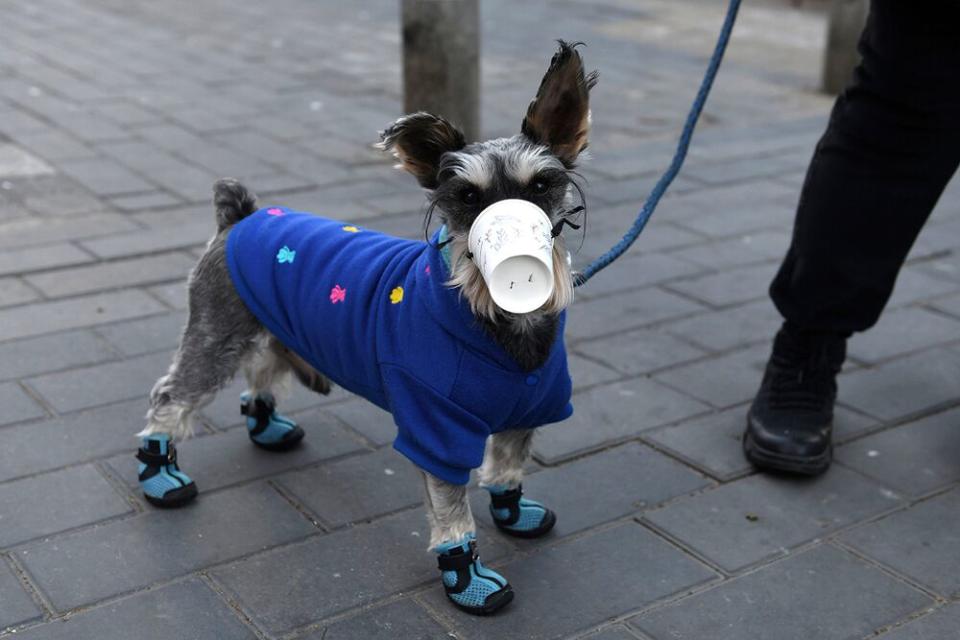Volunteers Go Door to Door to Rescue Pets Left Behind in China During Coronavirus Outbreak
In China, a collective of caring animal lovers is looking out for the pets left behind amid the growing coronavirus crisis.
With Wuhan, China, a city home to over 11 million people that is also considered to be the epicenter of this new coronavirus outbreak, under lockdown, many pet owners have been blocked from returning home after traveling out of town.
This means numerous animals are stranded in Wuhan without their owners. Luckily, volunteers from the Wuhan Pet Life Online community and other local rescue groups have stepped in to save the dogs and cats unintentionally abandoned by their owners from starvation during the public health scare.
One veterinarian, who asked to remain anonymous, told the South China Morning Post that Wuhan Pet Life Online has rescued 2,000 pets since Wuhan was put on lockdown on Jan. 23.
“The pets were found in homes with no food and water. Their owners left their houses last month not expecting that they would not be able to return home,” the volunteer said. “Pets are beginning to starve to death or die from thirst.”
RELATED: 23 Dramatic Photos of the Coronavirus Outbreak


One 43-year-old Wuhan citizen put himself at risk to help rescue the animals trapped in homes across the city, telling Reuters that the demand for help is nearly insurmountable.
“The volunteers on our team, me included, have saved more than 1,000 pets since Jan. 25,” the man said, estimating that 5,000 animals are still trapped and in need. “My phone never stops ringing these days. I barely sleep.”
The outlet also reported that some pet owners have gone to great lengths to protect their cats and dogs from the coronavirus, even though the virus hasn’t been proven to transmit from humans to animals.
“I haven’t found any pet masks, so I’ve made one myself with a paper cup,” one poodle owner in Beijing told Reuters.
Anne Kimmerlein, DVM, MPVM, DACVPM — a veterinary epidemiologist for VCA Animal Hospitals — told PEOPLE in January that she would not recommend face masks for dogs or other pets.
“While pictures of Chinese dogs wearing face masks are showing up online, there’s no scientific evidence that these masks protect dogs from either infectious diseases or air pollutant,” Kimmerlein told PEOPLE. “Dogs’ faces have a lot more variation than human faces do, meaning that a face mask designed to fit one type or breed of dog is unlikely to fit most others. Additionally, we cannot explain to a dog why we are putting something potentially scary or uncomfortable on their face.”
She added that there is also no evidence that pets are at risk of contracting this new coronavirus.
Additionally, using masks as a preventive measures against coronavirus isn’t recommend for humans either.
“Wearing a mask when you’re not sick has not been proven to help protect you with this kind of illness. It’s not something that I would do at this point unless you’re in an unusual situation where you’re around someone that you know is sick, but I wouldn’t recommend it,” Dr. Angela Hewlett, the medical director of the Nebraska Biocontainment Unit, told PEOPLE about why masks aren’t recommended for healthy individuals.
Never miss a story — sign up for PEOPLE’s free daily newsletter to stay up-to-date on the best of what PEOPLE has to offer, from juicy celebrity news to compelling human interest stories

RELATED: Arizona Man, 64, Continues to Feed Local Stray Cats Despite Police Pressure to Stop
This new coronavirus, a respiratory illness with pneumonia-like symptoms, has infected more than 40,000 and killed 910 in China as of Feb. 10, with 12 cases so far in the U.S.
A volunteer from another animal rescue organization told the SCMP that they have hundreds of other homes still to check on.
“There are still 700 more households’ requests to handle,” said the volunteer. “According to the degree of urgency, we do triage, handling the urgent cases first.”
They added: “There have been several tragedies in which pets had already died before we got into the house.”

